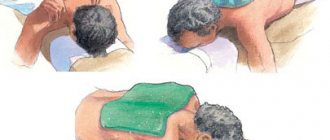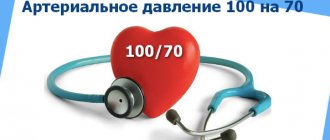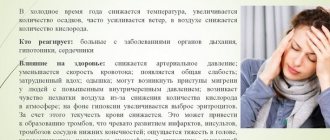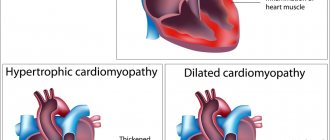Many people constantly and carefully monitor the weather forecast. And all because their well-being depends on weather conditions. How exactly? It's not always the same. Some people have pain in their joints before the rain, while others have worse migraines during the cold season. Any such response to changing weather conditions is called meteosensitivity .
Inside our body, the same parameters favorable for the life and work of body cells must be constantly maintained - temperature, blood pH, pressure. And normally the body knows how to do this - this is called homeostasis. This work is carried out by the autonomic, or autonomic, nervous system. What exactly does she do? Reduces the lumen of blood vessels, thereby increasing blood pressure, or, conversely, dilates them. Increases or decreases heat transfer, thus adapting to the outside temperature. These and other mechanisms help our body adapt to environmental conditions.
But it happens that a malfunction occurs in the functioning of the autonomic nervous system - it begins to work out of order, an imbalance occurs. And then the reaction to weather changes ceases to be adequate. In addition, an imbalance in the functioning of the autonomic nervous system is the main cause of VSD, and therefore meteosensitivity is a frequent companion of people with vegetative-vascular dystonia.
Who most often suffers from weather sensitivity?
These are teenagers during puberty, women, especially during pregnancy and menopause - that is, when hormonal levels are especially unstable. These are also hypertensive, hypotensive and those suffering from cardiovascular diseases. People living in big cities also often complain about their dependence on the weather forecast.
In autumn and spring, complaints about deterioration of health due to the weather are especially common - at this time the temperature and atmospheric pressure are rarely stable. Sometimes temperature fluctuations can reach 15-20 degrees per day!
Weather dependence is not a disease: scientists explain why headaches occur
Photo from goodtoknow.co.uk
Weakness, malaise, increased or decreased blood pressure, shortness of breath, insomnia, joint pain and, finally, migraines are the symptoms that some of us suffer from due to changes in atmospheric pressure, high humidity, sudden changes in temperature and thunderstorms.
But the influence of weather is not limited to this. There are modern scientific studies that find a correlation between meteorological factors and the number of strokes.
A team of Chinese scientists from Harbin University analyzed data from 735 patients over 2 years and compared it with detailed weather office reports. The researchers found that primary hemorrhagic strokes (bleeds in the brain) with a sharp increase in pressure occurred more often in late spring and early autumn on days when there was a sharp warming or cold snap, and subarachnoid hemorrhages (in the cavity between the arachnoid and pia mater) - on days with relatively low temperature.
Does this mean that weather dependence is a real disease that can lead to life-threatening consequences such as a stroke?
This is not entirely true. The modern medical classification of diseases does not include weather dependence as a separate disease. Weather is an external factor that acts on the body and provokes those manifestations that are the result of some diseases and disorders of the body itself.
A healthy person is highly adaptive, that is, external conditions, of course, affect him and may cause some discomfort, for example, it is difficult for any of us to tolerate heat above the temperature of the human body, but generally they do not lead to severe malaise.
Weather dependence is, as a rule, a manifestation of diseases of the cardiovascular or nervous system, asthma, arthritis, which make a person highly sensitive to external triggers, including the weather factor.
Changes in atmospheric pressure cause natural changes in pressure in blood vessels and tissues. When pressure drops, hypoxia develops, that is, a decrease in oxygen levels in tissues, which leads to dizziness, nausea, heart pain and headaches.
With an increase in atmospheric pressure, blood pressure also increases, blood flow increases, which can also lead to illness, sometimes very serious.
Photo from edition.cnn.com
In a healthy person, dilated or spasmodic vessels quickly return to their normal state due to their elasticity, but if they lose elasticity, it is difficult for the body to quickly adapt in accordance with the dynamics of the environment.
There are three degrees of weather dependence.
1st degree – meteosensitivity . With certain weather changes, a person feels only a slight discomfort that does not cause much discomfort.
2nd degree – actual weather dependence . The body reacts to certain weather factors with noticeable deviations from the norm, for example, an increase or decrease in blood pressure and the occurrence of severe headaches. There may be an irregular heart rhythm, and even an increase in the level of leukocytes in the blood.
3rd degree - meteoropathy , when weather phenomena lead to temporary disability.
Statistics on weather dependence are very limited, but there is data on its individual symptoms. Of these, the most common is, of course, a headache.
In the United States, about 45 million people annually consult doctors with complaints of headaches, and half of them report that weather changes are the most important trigger. These very extensive statistics are backed up by medical studies under controlled conditions.
In a 2015 Japanese study, 34 patients with chronic migraines were supervised by doctors and kept diaries of their condition. All of them felt good at 1013 hectopascals (759.8 mmHg), and this atmospheric pressure was taken as the standard.
It was found that study participants suffered from migraines even with relatively small decreases in atmospheric pressure - only 6-10 hectopascals.
But an international group of scientists from Taiwan, the USA and Great Britain, having analyzed a large array of statistical data, found that in different geographical areas, migraine attacks among study participants were correlated with different weather factors: air temperature, low pressure, strong winds, approaching typhoon, approaching cold weather. atmospheric front.
At the same time, some studies do not find any connection between meteorological factors and headaches at all, which may indicate that there are climatic zones that are more or less favorable for a weather-dependent organism.
There is also a theory that the so-called atmospherics (or simply spherics) are responsible for migraines. These are low-frequency electromagnetic waves, the source of which is atmospheric electrical discharges, such as lightning.
Atmospherics have weak attenuation and can propagate over distances of up to several thousand kilometers. That is why their presence in the atmosphere is possible even if there was no thunderstorm directly in the area. Atmospherics affect the cells and membranes of the body and can cause migraine attacks in weather-dependent people.
People suffering from rheumatoid arthritis often complain of weather dependence. They are sure that they feel increased joint pain when rain or stormy weather approaches as a result of fluctuations in atmospheric pressure. However, until recently, most research did not find a correlation between weather changes and arthritis symptoms.
Photo from thedailybeast.com
Maybe this is a kind of “nocebo effect”? So, by analogy with the placebo effect, they call a situation when a certain dummy factor negatively affects the patient’s condition due to the fact that the latter is confident in its real negative impact.
An impressionable person suffering from arthritis may well be influenced by the weather forecast, which reports increased humidity and fluctuations in pressure.
Recently, however, scientific works have appeared demonstrating, albeit weakly, a correlation between meteorological factors and pain and tension in diseased joints.
For example, in this Dutch study, scientists observed patients suffering from arthritis of the hip joints for two years. They compared records of their condition with meteorological data for the same period and found that there was indeed a correlation between them.
The changes in condition were not dramatic, but were clearly visible.
The severity of pain increased by 1 point for every 10% increase in humidity. The functioning of the joints deteriorated by 1 point for every 10 hectopascals increase in atmospheric pressure.
According to experts, changes in barometric pressure can affect the pressure inside the joint, which contains extremely sensitive nerve endings, and this can lead to increased pain.
What can be done to alleviate weather sensitivity?
The main and main advice is to treat the disease that leads to it.
There are, of course, some recommendations regarding lifestyle.
Most weather-related ailments are caused by weak blood vessels, so these are the ones that need to be strengthened. Hardening measures are good for this purpose: contrast showers, dousing with cold water, cold rubdowns.
As always, you can’t do without fresh air and physical exercise: jogging, active walking, hiking in nature, swimming in reservoirs, working out in the gym - all these components of a healthy lifestyle will strengthen the body and reduce weather sensitivity.
Experts recommend that weather-sensitive people select a set of breathing exercises and perform them on unfavorable days to reduce hypoxia.
An important factor in health is proper sleep patterns. With chronic sleep deprivation, your body will be very sensitive to fluctuations in the state of the external environment.
You may need to take restorative medications. These include B vitamins, and Ascorutin, which strengthens blood vessels. The likelihood of a negative effect of vitamin preparations is extremely low, but it is advisable to consult a doctor who will give recommendations regarding the duration of use and compatibility of medications.
Numerous articles on weather dependence on the Internet are replete with the names of general health-improving agents of plant origin. The authors recommend extracts of eleutherococcus and echinacea, infusions of nettle leaves, plantain and corn silk, oregano, St. John's wort, linden blossom, rose hips and hawthorn. You should try them carefully, taking into account allergies and individual reactions, because if something helped your friend, it will not necessarily have the same effect on you.
Photo from globalnews.ca
If the main symptom of your weather dependence is headache, read this article. Perhaps you will find useful information in it.
Sources:
Weather and Headache
Study Finds Evidence of Connection between Arthritis Flare-Ups and Weather Conditions
Headaches in weather-dependent people
Weather dependence - symptoms, treatment, how to get rid of weather dependence?
So what should you do if you feel like the weather is having a big impact on you?
Try keeping a journal of how you feel. If deterioration occurs, write down what exactly hurt, what the weather was like at that moment and other factors that you consider important. Then, after analyzing the data for a more or less long period, you will be able to predict in advance an attack of poor health, which means taking preventive measures. In addition, such a diary will become an invaluable source of information if you decide to see a doctor.
Hardening, physical activity, proper nutrition - all this will be good prevention. Try to get a good night's sleep. You can add chamomile, mint to tea, brew rose hips, or resort to other soothing and relaxing remedies. It is also better to give up alcohol and limit the amount of coffee, tea and other stimulants.
How to prevent headaches as a result of changes in atmospheric pressure?
Most people get headaches when their air pressure is too low or too high. What to do in this case? The best solution in the presence of weather dependence is healthy sleep, putting your lifestyle in order and maximizing the body’s ability to adapt. In particular, you need:
- Rejection of bad habits.
- Minimizing tea and coffee consumption.
- Hardening, contrast shower.
- Formation of a normal daily routine and adherence to a good sleep schedule.
- Reducing stress.
- Moderate physical activity, breathing exercises.
- Walking in the fresh air (can be combined with physical therapy).
- Consumption of adaptogens, such as ginseng, eleutherococcus, and lemongrass tincture.
- Taking courses of multivitamins.
- Healthy and nutritious nutrition. It is advisable to consume more foods containing vitamin C, potassium, iron and calcium. Fish, vegetables and dairy products are recommended. Hypertensive patients should not consume salt.
What medications help combat weather sensitivity?
It is equally important to look at the root of the problem and eliminate the cause of meteosensitivity - improper adaptation of the body to the weather. To do this, you need to improve the functioning of the autonomic nervous system. Eltacin can help .
The drug “Eltacin”
Eltacin contains a complex of amino acids - cystine, glycine and glutamic acid, which activate metabolism in the body and improve the supply of energy and oxygen to cells, helping to restore the balance of autonomic regulation. Eltacin reduces the impact of weather factors on the functioning of the cardiovascular system and helps improve well-being when the weather changes.
Be that as it may, it is important not to miss the development of serious diseases, which for some time can hide under the guise of meteosensitivity. Therefore, if the above prevention methods do not help and your health worsens, be sure to consult a doctor.
Types of weather dependence. How are they different from each other?
Scientists distinguish the following types of weather dependence:
- cerebral – the appearance of headaches, dizziness, tinnitus;
- cardiac – the occurrence of painful sensations in the heart, disturbances in heart rhythm, increased breathing, sensations of lack of air;
- mixed - combines the symptoms of the first two types;
- asthenoneurotic – the appearance of weakness, irritability, depression, decreased performance;
- uncertain – a feeling of general weakness of the body, pain in the joints, lethargy.
At-risk groups
This group mainly includes people with chronic diseases and the elderly with age-related health changes. The risk of weather dependence increases in the presence of the following pathologies:
- Respiratory diseases (pulmonary hypertension, chronic obstructive pulmonary disease, bronchial asthma). Severe exacerbations occur.
- Damage to the central nervous system (stroke). There is a high risk of recurrent brain damage.
- Arterial hypertension or hypotension. A hypertensive crisis with the development of myocardial infarction and stroke is possible.
- Vascular diseases (atherosclerosis of the arteries). Atherosclerotic plaques can break away from the walls, causing thrombosis and thromboembolism.
Headache due to decreased atmospheric pressure: how to prevent?
Why do headaches appear at low atmospheric pressure? This is explained by the fact that the blood vessels narrow. Blood pressure decreases and pulse weakens. Breathing becomes difficult. Intracranial pressure increases, which contributes to spasm and headache. Hypotonics suffer mainly. This can lead to serious consequences. For a hypotensive person in this situation, the danger lies in the onset of a hypertensive crisis and coma.
Low atmospheric pressure, headaches... What to do? In this case, it is recommended to get enough sleep, drink more water, drink coffee or tea in the morning, and also take a contrast shower.
So, a decrease in atmospheric pressure for hypotensive people is fraught with headaches and can lead to disruptions in the functioning of body systems. Therefore, such people are recommended to regularly harden themselves, give up bad habits, and normalize their lifestyle as much as possible.










